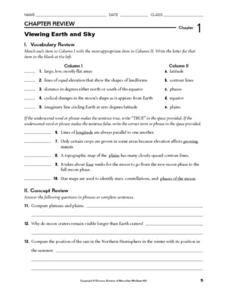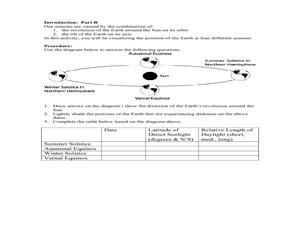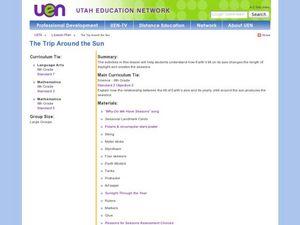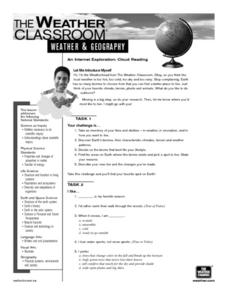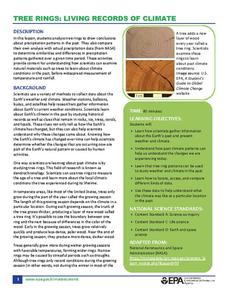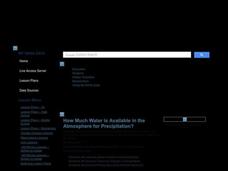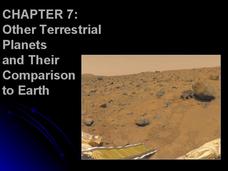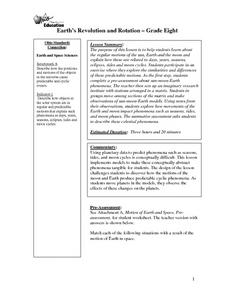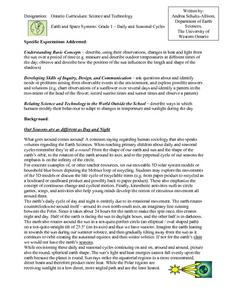Curated OER
Science Trail
Students explore the solar system by conducting Earth science experiments. In this Sun lesson plan, students identify the different seasons on Earth and discuss their purpose and cause. Students create a sundial and observe the changes...
Curated OER
Planet Earth
In this Earth learning exercise, students review the characteristics of the Earth including it's rotation and revolution. This learning exercise has 9 fill in the blank and 7 short answer questions.
Curated OER
Charting Seasonal Changes
Students research the Earth's patterns of rotation and revolution, create a chart and graph of these patterns and use them to explain the causes of night and day and summer and winter.
Curated OER
Introduction To Seasons
The purpose of this lesson is to introduce the students to a unit on seasons. The Students will learn how to navigate a PowerPoint presentation. They will use the PowerPoint presentation to take a pre test in order to determine the prior...
Curated OER
Viewing Earth and Sky
In this earth and sky learning exercise, students review terms associated with map reading. Students also review topographic maps and how contour lines represent elevation. This learning exercise has 5 matching, 5 true or false, 5 fill...
Curated OER
Seasons and Cloud Cover, Are They Related?
Students use NASA satellite data to correlate cloud cover over Africa to the solar declination.
Curated OER
Suns Path and Seasons
Using a plastic dome to represent the hemisphere of the sky, your class is able to demonstrate the path of the sun at different points of the day and year. They use a protractor to record movement and answer questions about elapsed...
Curated OER
The Trip Around the Sun
Sixth graders investigate the relationship between the tilt of the Earth's axis and the seasons. For this earth science lesson, 6th graders sing the song "Why Do We Have Seasons" and use simulate the Earth's tilt by using their bodies.
Curated OER
2003 Tornado Season
In this science worksheet, learners find the words that introduce different vocabulary terms related to tornadoes. The answers are found at the bottom of the page.
Curated OER
SCHOOLYARD SUNDIAL
Students study the apparent motion of the Sun in the sky over the course of a day and a year, and analyze what causes seasons on Earth. They participate in a project that has both a science as well as an art component.
Odyssey of the Mind
Odyssey of the Mind Curriculum Activity: From a Distance
Challenge your class with an amazing set of ideas that really put the project back into project-based learning. It all starts with a whole class research task. Each learner will look up and take notes on multiple facets of things that...
Curated OER
Cryosat Mission
Beginning with general information on satellites and seasons, concluding with polar ice and the Cryosat Mission, this worksheet gives your earth scientists an opportunity to conduct some research. Most of the assignment consists of short...
Curated OER
Cloud Reading
Students identify the biomes of the Earth and their characteristics. They discuss their favorite seasons and the weather. They share their favorites with the class.
US Environmental Protection Agency
Tree Rings: Living Records of Climate
Open with a discussion on weather and climate and then explain how tree rings can provide scientists with information about the earth's past climate. Pupils analyze graphics of simulated tree rings from various US locations for the...
Curated OER
How Much Water is Available in the Atmosphere for Precipitation?
Students explore the relationship between the amount of water in the atmosphere available for precipitation and the actual precipitation observed by satellite. They examine seasonal changes in precipitation. They practice using Internet...
Glynn County School System
Terrestrial Planets
Mercury, Venus, Earth, and Mars are collectively known as the terrestrial planets. Although part of the same group, each planet has its own set of characteristics. Scholars explore the characteristics that make the planets unique and...
Mr. E. Science
Climate and Climate Change
What factors make up climate? How does longitude and latitude affect climate? What is causing Earth's climate to change? These questions are the topic of a presentation that explains characteristics of climate and climate change.
NOAA
Ocean Layers II
Now that you know the ocean has layers, let's name them. The seventh installment of a 23-part NOAA Enrichment in Marine sciences and Oceanography (NEMO) program covers terminology associated with ocean layers, such as thermocline and...
Berkshire Museum
Reduce, Reuse, and Recycle: Sorting Through Personal Choices
Raise children's awareness about the importance of conservation with this hands-on science lesson. Start by breaking the class into groups and having them collect trash from around the school or local park. Students then use the provided...
Curated OER
Seasons
Students identify and define the vocabulary words: summer, spring, fall, and rotation. They describe how the earth's rotation affects the seasons. Students match appropriate clothing with each season. They discuss why a particular...
Curated OER
The Four Seasons - Earth's Rotation
Students identify characteristics in correlation with each season and identify dates of the changing seasons. They identify and describe how the Earth rotates around the sun and its effects on the temperatures of the earth.
Curated OER
Does the Distance Between the Earth and Sun Cause the seasons?
Students reflect upon the concepts of seasons. The concepts are taught using a variety of different teaching approaches. A activities lead to a reflection that will help students to make a cognitive transfer of information form...
Curated OER
Earth's Revolution and Rotation
Eighth graders investigate the regular motions of the sun, Earth and the moon and explain how these are related to days, years, seasons, eclipses, tides and moon cycles. They participate in an exercise where they explore the...
Curated OER
Science: Daily and Seasonal Cycles
First graders use their observations to describe daily and seasonal cycles. through a demonstration using a suspended ball and flashlight, they determine the time of day in various locations. Next, 1st graders participate in a...






